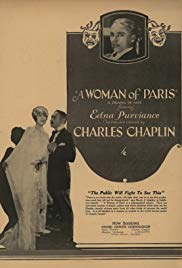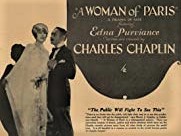A Woman of Paris: A Drama of Fate **** (1923, Edna Purviance, Adolphe Menjou, Clarence Geldart, Carl Miller) – Classic Movie Review 9234
Charles Chaplin wrote, produced and directed the silent 1923 romantic drama A Woman of Paris, a simple story of a country girl called Marie St Clair (Edna Purviance) who believes she has been jilted and goes off to the big city of Paris, becomes the mistress of wealthy charmer Pierre Revel (Adolphe Menjou), and loses the one man she truly loves, her artist fiancé Jean Millet (Carl Miller).
A Woman of Paris is sometimes contrived, sentimental and manipulative, and lacks the effortless style and humour of Chaplin’s best comedy films. But it is a beautifully detailed, charming, even beguiling tale, with elements of satire and melodrama combining to great effect. As a drama, it was a risky, major departure for him, and, as such, disappointingly it was the first major failure in Chaplin’s career.
Chaplin appears in an unbilled walk-on as a railway station porter, carrying a huge box over his head.
Also in the cast are Lydia Knott as Jean’s Mother, Charles K French as Jean’s Father, Clarence Geldart [Clarence Geldert] as Marie’s Step-Father, Betty Morrissey as Fifi and Malvina Polo as Paulette.
It was originally silent, but a musical score soundtrack by Chaplin was added for its re-release in 1976. The re-issue of the film with his new score and new cut by was the last work of his career. The re-release was met by great critical and public praise, and the film was re-evaluated. A Woman of Paris was his first drama and first film as a partner in United Artists.
It is the first of only two films Chaplin directed in which he does not star. The other is A Countess from Hong Kong (1967).
The film had the effect of boosting Menjou’s career rather than Purviance’s, as intended. However, her name was linked to a scandal. On New Year’s Day 1924, she was at a party with oil tycoon Courtland Dines and Mabel Normand when Normand’s chauffeur shot Dines with Normand’s gun ‘defending Mabel Normand’s honour’. The film was even banned in several American towns.
A Woman of Paris is directed by Charles Chaplin, runs 82 minutes or (1976 release), is made by Charles Chaplin Productions, is released by United Artists, is written by Charles Chaplin, is shot in black and white by Roland Totheroh and Jack Wilson, is produced by Charles Chaplin, is scored by Charles Chaplin (1976), and is designed by Arthur Stibolt.
© Derek Winnert 2019 Classic Movie Review 9234
Check out more reviews on http://derekwinnert.com



